Follow along with newly translated talks by Thich Nhat Hanh from 2012/13 which explore the true meanings of what the Buddha taught.
In Plum Village monasteries, the Rains Retreat is a tradition that dates from the time of the Buddha. For 90 days, Plum Village nuns and monks stay within the boundaries of their monastery and use this time to deepen their mindfulness practice and study. When Thich Nhat Hanh first introduced this practice in Plum Village Monastery, France, it was called the Winter Retreat. Over the rest of the year, Thay would mostly teach in English or French at Plum Village or on tour around the world, but during Winter Retreats he predominantly taught in Vietnamese. He would use these retreats as opportunities to deeply explore an aspect of Buddhism.
During the 2024/25 Rains Retreat in Plum Village Monastery, France, the community are revisiting teachings Thay gave in Vietnamese during the 2012/13 Winter Retreat on the subject of being a “Soulmate of the Buddha”. This was the penultimate Winter Retreat that Thay taught before his stroke in 2014. These talks show Thay’s affection and appreciation for the Buddha, but also a critical eye as to how many teachings have been historically misinterpreted and misunderstood. By examining the context of India during the time of the Buddha, Thay goes to the heart of what the Buddha was offering us and makes connections between the Buddha’s sutras and Plum Village practices as an accessible yet undiluted expression of the Buddha’s teachings.
During these talks, Thay addresses topics such as:
- Reincarnation, samsara, karma and retribution
- The Eightfold Path and Four Noble Truths
- The Three Dharma Seals including nirvana, impermanence and no-self
- Conventional and ultimate truth
- Thay’s radical update of the Twelve Links of Dependent Origination
- Western dualism and it’s impact on Buddhism
- Life after death
- Core Plum Village practices such as sitting, walking, eating, Touching the Earth, and the Ten Mindful Movements
In this Rains Retreat the community has been enjoying collectively watching a talk from Thay each Wednesday. A dedicated team of monastics has worked tirelessly to create new subtitles for the talks. The themes from the talks have been picked up by the Dhama teachers in live talks on Sundays. We invite you to join us on this journey and enjoy the many Dharma gems Thay offered us in 2012/13. (This page will be updated with further talks as they are released.)
How should we approach the Buddha’s teachings?
November 8 2012, Lower Hamlet, Vietnamese
In this opening talk for the Rains Retreat, Thay explains about the 10 mindful movements and the practice of “not thinking” while walking or sitting. He introduces the theme, “Soulmate of the Buddha”: Buddhists have misunderstood the Buddha so deeply. We have to help the Buddha. Thay presents, as a foundation for the coming talks, the methodology of the Four Criteria of Truth and the Four Reliances. He offers a Dharma Sharing topic: “Am I free enough?”
Buddhist misunderstandings of reincarnation, samsara, karma and retribution
November 11 2012, New Hamlet, Vietnamese
Thay presents Buddhist misunderstandings of reincarnation, samsara, karma and retribution. There is a tendency to follow annihilistic thinking, or thinking that we have an immortal soul. Many of these ideas predated the Buddha. Thay explains the context in India, and how meditation teachers taught the Four Dhyanas. He explains how they taught Four Practices of Brahma (four immeasurables) and the Four Psychic Powers. Thay explains how important it is not to mix up the Two Truths.
The Eightfold Path is the cream of the Buddha’s teaching
November 15 2012, Upper Hamlet, Vietnamese
The power of love is more powerful than the Psychic powers. The Eightfold Path is the cream of the Buddha’s teaching, not samsara, karma and reincarnation, which were existing ideas that were there already. Thay offers commentary on the Chanda Sutra. He explains the Three Dharma Seals should include nirvana. And “nirvana” must be understood correctly: it cannot be death, let alone “eternal death”. Nirvana transcends all notions of existence and nonexistence. Thay begins commentary on Nāgārjuna’s Mūlamadhyamakakārikā, Chapter 13.
Common misunderstandings about the Four Noble Truths
November 18 2012, New Hamlet, Vietnamese
The cream of the Buddha’s teaching is not samsara, karma, retribution but the Four Noble Truths and the Noble Eightfold Path. You cannot just study, you have to practice to get the insight. Thay clarifies common misunderstandings about the Four Noble Truths. It is important to not mix up historical and ultimate truths. Thay continues commentary on Nāgārjuna’s Mūlamadhyamakakārikā, Chapter 13, verses 1-5.
Cultivating Insight: Impermanence and no–self
November 22 2012, Lower Hamlet, Vietnamese
Cultivating insight, right view and right thinking. More on “how we think” and perceive, and the limits of thinking, and the importance of not thinking. Further commentary on the Chanda Sutra: the teaching of no-self and impermanence is “the cream of Buddhism”. Impermanence is wonderful and makes life possible. People mistakenly interject the idea of self, but there’s no need to have a self for there to be action. Thay also teaches on Zorro, Conditioned Genesis, and Udana Sutra.
Thay’s update to the 12 links of dependent origination
November 25, 2012, Upper Hamlet, Vietnamese
Thay offers more commentary on the Chanda Sutra and the misunderstandings around the Three Dharma Seals. For the first time, Thay introduces a comprehensive update to the twelve links of dependent origination and explains why.
A summary of the talks so far
November 29, 2012, Lower Hamlet, English
Thay offers, in English, a summary of the talks he has given so far in 2012/13 the Winter Retreat.
Buddhism, the West, and Dualism
December 6, 2012, Upper Hamlet, Vietnamese
The West has a Dualistic way of thinking, separating, for example, sacred from profane, and creator from creature. In this talk, Thay warns that: “If we’re not careful the West will denaturalize Buddhism, through the influence of Dualistic thinking.” He explains that Right View is free from Dualism and that you cannot separate means and end, offering us the phrase: There is no way to nirvana. Nirvana is the way.
Loneliness and how our notions of birth and death lead to the suffering Samsara
December 13, 2012, New Hamlet, English
Thay teaches that loneliness is the sickness of our time. He offers us a visual representation on the whiteboard of how we can go home to ourselves and help others go home to themselves. He offers more explanations of the Buddha’s sutras on self and no-self, being and non-being, co-arising entities, no birth and no death. He also offers a summary of 12 links of dependent origination revision as well as summarizing the weaknesses of the traditional 12 links teachings.
The Buddha’s purpose was to relieve suffering
December 16, 2012, Upper Hamlet, Vietnamese
This talk was given after the Sandy Hook school massacre. Thay reminds us of the importance of going home to take care of ourselves. He offers a recap of the teachings on the Three Dharma Seals. He reminds us that the Buddha was not there to make theories, doctrines, or philosophy; his purpose was to relieve suffering. And that nonself and impermanence are practices and insights to help us, not doctrines to get attached to.


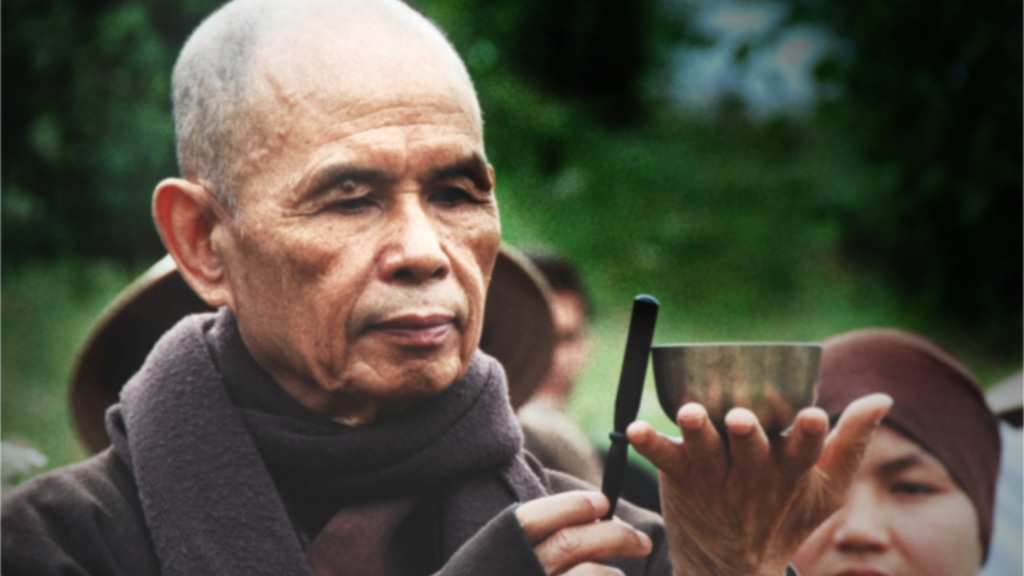
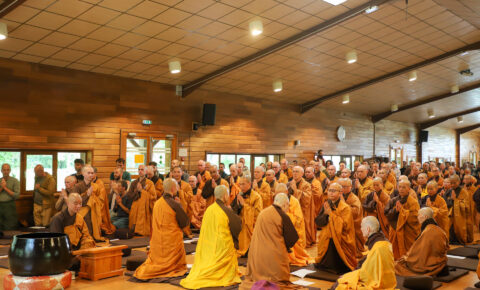
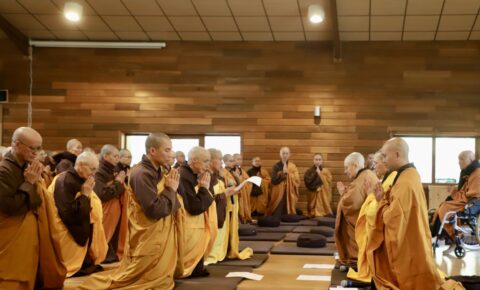
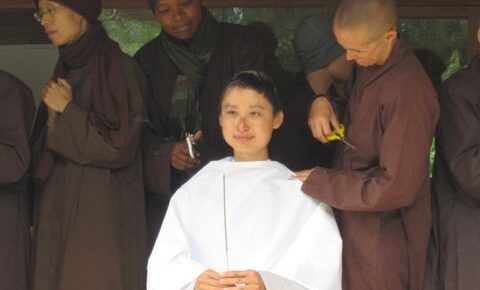
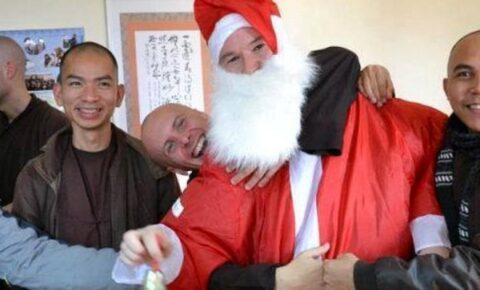
Share Your Reflections